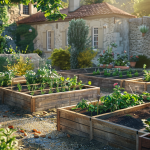Navigating the world of mental health often feels like traversing a labyrinth. It’s complex, filled with twists and turns, and everyone’s path is unique. Among the myriad treatments available, one stands out for its roots in nature and proven effectiveness: horticultural therapy. According to reputable scholars and resources like Crossref, Google Scholar and PubMed, this green approach shows promising results for people suffering from Post-Traumatic Stress Disorder (PTSD).
Horticultural Therapy: A Green Approach to Mental Health
Horticultural therapy is an innovative method that uses gardening-related activities as a treatment for improving mental health. Rooted in the idea that interacting with plants and nature can have therapeutic benefits, it is a clinically validated practice used worldwide in hospitals, rehabilitation centers, and psychiatric facilities. As listed on Google Scholar and PubMed, numerous studies validate the therapeutic benefits of gardening for mental health, particularly for stress reduction.
A voir aussi : Can Wearable Fitness Technology Accurately Predict the Risk of Sudden Cardiac Arrest?
Horticultural therapy involves a variety of activities ranging from simple tasks like planting seeds and watering plants, to more complex ones like designing a garden space. These activities are guided by a trained therapist with the aim to achieve specific therapeutic treatment goals.
Nature and Mental Health: The Healing Power of Green
The connection between nature and mental health is undeniably strong. Research from Crossref and PubMed show that exposure to green spaces can significantly reduce stress levels and improve overall well-being. This is the therapeutic power that horticultural therapy taps into.
Lire également : How Can Artisan Bread Baking at Home Improve Emotional Well-being and Creativity?
Nature offers a serene and tranquil environment that allows you to disconnect from the fast-paced, often stressful, modern life. The sight of flourishing plants, the smell of fresh soil, the sensation of a soft breeze, and the sound of rustling leaves, all create a calming ambiance that helps to alleviate stress.
Furthermore, the act of gardening itself is therapeutic. By nurturing plants, you are indirectly nurturing yourself, developing patience, and understanding the value of care and growth. These qualities, along with the physical activity involved in gardening, can aid in reducing symptoms of PTSD and improving mental health.
Horticultural Therapy and PTSD: A Blooming Relationship
Post-Traumatic Stress Disorder (PTSD) is a psychiatric disorder that can occur in people who have experienced or witnessed a traumatic event. Symptoms may include flashbacks, nightmares, severe anxiety, and uncontrollable thoughts about the event.
Research, as indicated by Google Scholar, suggests that horticultural therapy can provide a therapeutic outlet for these symptoms. It offers a safe, non-threatening environment where individuals can express themselves freely and gain a sense of control and accomplishment.
It’s also a form of group therapy. Participants tend to find comfort in the company of others who are going through similar experiences. They can share their stories, discuss their progress, and provide support to each other, which can significantly contribute to their healing process.
Studies and Findings: The Evidence Behind the Green
Several studies have been conducted to investigate the effectiveness of horticultural therapy for individuals with PTSD. In one study listed on PubMed, military veterans who participated in a 12-week horticulture therapy program reported significant reductions in PTSD symptoms. They also reported improvements in their quality of life, social functioning, and physical health.
In another study listed on Crossref, participants who engaged in a horticultural therapy program exhibited reduced depression and anxiety symptoms, improved social interaction, and a greater sense of accomplishment.
These findings provide robust evidence for the therapeutic benefits of horticultural therapy for individuals with PTSD. Although more research is needed to fully understand the mechanisms underlying these benefits, the current evidence strongly suggests that this green approach can be a valuable tool in the treatment of PTSD.
Integrating Horticultural Therapy into Treatment Plans
Implementing horticultural therapy as part of a treatment plan for PTSD can be a refreshing approach. It allows individuals to be active participants in their recovery, rather than passive recipients of medication or traditional talk therapy.
Horticultural therapy does not require any gardening expertise. It is about immersing oneself in the process, enjoying the interaction with nature, and experiencing the sense of achievement that comes from seeing a plant grow and flourish. It is about finding solace in the simplicity of nature and gaining the strength to face the complexities of life.
In the vast and ever-evolving field of mental health treatments, horticultural therapy represents a promising avenue for individuals with PTSD. This green, nature-based approach offers a unique and effective way of reducing stress, alleviating symptoms, and improving overall mental health, all while fostering a sense of community among participants.
The Role of Horticultural Therapy in Holistic PTSD Treatment
Using horticultural therapy as a part of a comprehensive PTSD treatment plan can offer a holistic approach to healing. This form of therapy, as mentioned above, includes gardening-related activities guided by a trained therapist, which can help individuals cope with traumatic stress in a safe and calming natural environment.
According to an article on PubMed, horticultural therapy can help improve the quality of life for PTSD sufferers by providing them with a sense of accomplishment and control over their environment. This can significantly reduce feelings of anxiety and depression, common symptoms of PTSD.
Horticultural therapy is also seen to encourage social interaction, which is crucial for individuals with PTSD. As a form of group therapy, it allows sufferers to connect with others who share similar experiences, fostering a supportive community that is instrumental in the healing process. This sense of camaraderie can combat feelings of isolation, a common issue for those dealing with mental health disorders.
Furthermore, the physical activity involved in horticultural therapy can provide physiological benefits. As per a PMC free article, activities such as digging, planting, and watering can act as a form of exercise, which is known to reduce stress and improve overall health.
Lastly, horticultural therapy can complement traditional talk therapy and medication. The combination of these therapies can provide a comprehensive, individualized treatment plan that addresses the unique needs of each person.
Conclusion: The Potential of Horticultural Therapy in PTSD Treatment
In conclusion, horticultural therapy provides a viable option for the treatment of PTSD. Its emphasis on nature and active participation distinguishes it from traditional treatments, offering a unique approach to mental health care.
Review of studies on Google Scholar, Crossref, and PubMed suggest the positive effects of horticultural therapy on PTSD symptoms. It helps reduce anxiety and depression, foster social interaction, improve physical health, and enhance the quality of life.
It’s essential to keep in mind that while horticultural therapy offers many benefits, it is not a standalone solution for PTSD. Instead, it should be integrated into a comprehensive treatment plan that can provide a well-rounded approach to mental health care, considering each individual’s unique circumstances and needs.
The world of mental health treatments is vast and ever-evolving, and as research continues, so will the understanding and application of horticultural therapy for PTSD. As the evidence supporting the benefits of horticultural therapy continues to grow, it is our hope that more people will have access to this calming, green approach to mental health, bringing them closer to nature, and to their own healing.






